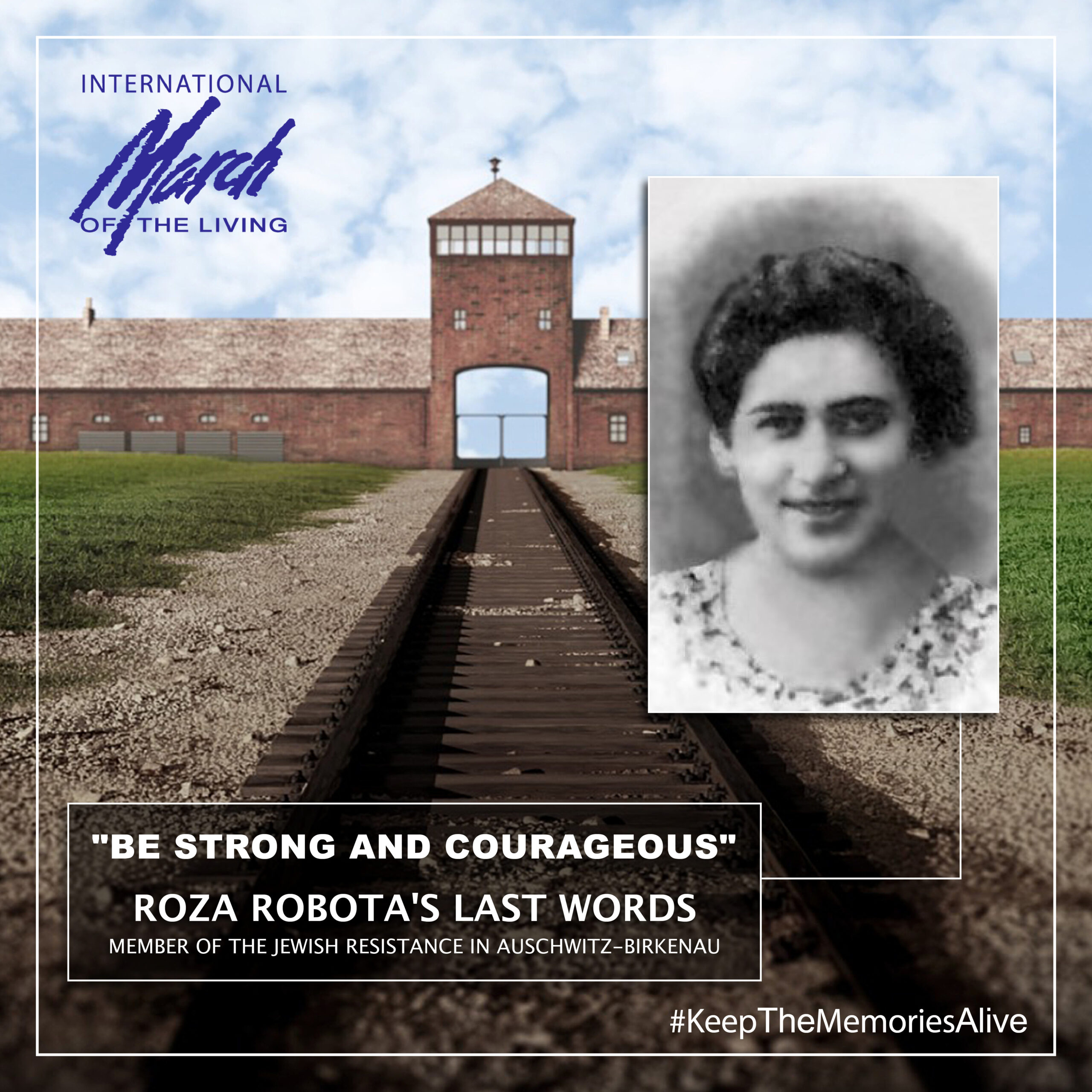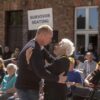
Roza Robota was born in 1921 in Ciechanów, Poland, a town north of Warsaw. In her teenage years she joined the Hashomer Hatzair Zionist Youth Movement. In November 1942 she was deported with her family to Auschwitz. With the exception of Roza, all were sent to the gas chambers. She was imprisoned in Auschwitz 1 and was later moved to the women’s camp in Birkenau.
Roza Robota was a part of a group of women working in the nearby Union munitions factory that enabled the rebellion in Birkenau, a revolt during which the Jews blew up two crematoriums and killed several Nazis. Her role was to smuggle gunpowder to the Sonderkommando units working in the gas chambers who were participating in the revolt.
Roza arranged an underground group of women who carefully smuggled leftover gun powder in tiny amounts every day into Auschwitz – between one to three teaspoons a day. They would rub the material on their bodies, risking their lives as they underwent daily checks by the Germans. When the women reached the camp, they would hand the gunpowder to Roza, who would pass it to the group of undercover members who planned the rebellion in the camp.
The weapon smuggling activity was carried out for more than 6 months – the Sonderkommando would bury the material in different areas near the crematoriums. On October 7, 1944, the rebellion broke out and the rebels managed to blow up one crematorium and disable one incinerator in Birkenau while seriously damaging another. During the rebellion, they injured more than twenty SS soldiers and killed three of them. A few hundred Sonderkommando even managed to escape from the camp, but the Germans hunted down those who escaped, catching and executing most of them.
The Germans realized that the gunpowder came from their own factory. They caught several women who were responsible for transferring the gunpowder to Roza. The women did not reveal the smuggling network. Despite this, Roza Robota was caught and put in Block 11 – the infamous torture block of the Gestapo in Auschwitz 1. Despite undergoing severe torture she did not break, and said nothing of the underground operation and their plans.. Research has proven that had she revealed the secrets, dozens of underground members would have been executed. But Roza did not break.
Before she was executed, she was visited by a fellow member of the underground, Noa Zabaldoich. “I did not tell them”, she told him, assuring him that she did not succumb to the brutal Nazi torture.
After the war, Noa Zabaldoich recalled his last encounter with her:
“I entered Roza’s cell, on the cold concrete floor lay a figure looking like a bundle of worn-out clothes. At the sound of the door opening, she turned to face me. I almost didn’t recognize her. Her eyes stayed the same; they looked gloomy and sad. Moments passed before a heavy sigh broke out from her heart. She then spoke her last words, “I did not tell” as she wanted her friends to know that they don’t need to be afraid. We must continue. It was easier for her to die knowing that we continued our mission. It’s a pity for life and that that’s how she left the world, what was her doing? She was not sorry for her actions, and that is how she died. She gave me a letter for the members that remained alive. She signed it “Be strong and courageous”. It was time for me to go, and I left the bunker. It was the last time I saw her face, but the image of her was one I will never forget”
On January 6, 1945, three weeks before the liberation of the camp and two weeks before its evacuation, Roza along with three other women – Ala Gertner, Ester Wajcblum, and Regina Safirsztajn – who were accomplices in the underground operations were executed. The other camp inmates were forced to attend the hangings. They reported that Roza Robota’s last words before she was executed was “Revenge” or “Be strong and courageous”. This was the last time Nazis managed to hang people in Auschwitz.
Roza Robota left a legacy of heroism by risking and sacrificing her very life, leading her fellow female inmates in one of the most courageous acts of resistance during the Shoah.
In 2023, as the world marks the 80th anniversary of the Warsaw Ghetto Uprising, International March of the Living is commemorating the heroic Jewish resistance that took place in the ghettos, camps and forests all across Nazi occupied Europe.
Note: Several March of the Living survivor educators were Auschwitz survivors. Two of them – Max Eisen and Anna Heilman – were in Auschwitz at the time of the hanging of the four women and shared their recollections with students on the March of the Living. (Anna Heilman’s sister, Ester Wajcblum, was in fact, one of the four women executed along with Roza Robota.)
See links below to their moving testimonies in Auschwitz on the March of the Living.
Max Eisen (4:17)
Anna Heilman (3:50)







